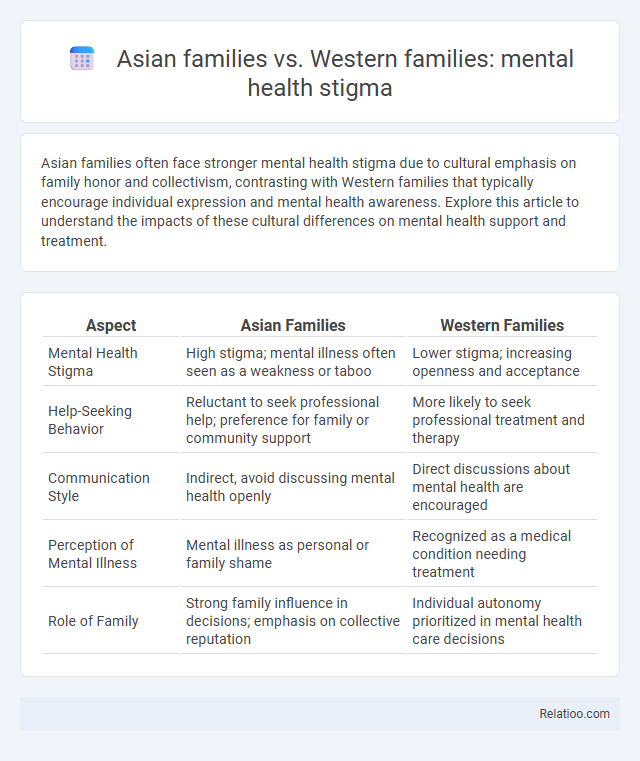Asian families often face stronger mental health stigma due to cultural emphasis on family honor and collectivism, contrasting with Western families that typically encourage individual expression and mental health awareness. Explore this article to understand the impacts of these cultural differences on mental health support and treatment.
Table of Comparison
| Aspect | Asian Families | Western Families |
|---|---|---|
| Mental Health Stigma | High stigma; mental illness often seen as a weakness or taboo | Lower stigma; increasing openness and acceptance |
| Help-Seeking Behavior | Reluctant to seek professional help; preference for family or community support | More likely to seek professional treatment and therapy |
| Communication Style | Indirect, avoid discussing mental health openly | Direct discussions about mental health are encouraged |
| Perception of Mental Illness | Mental illness as personal or family shame | Recognized as a medical condition needing treatment |
| Role of Family | Strong family influence in decisions; emphasis on collective reputation | Individual autonomy prioritized in mental health care decisions |
Understanding Mental Health Stigma: East vs. West
Understanding mental health stigma reveals that Asian families often face higher societal pressure to maintain family honor, leading to silence and shame around mental health issues, while Western families typically emphasize individualism and personal disclosure. Your approach to seeking mental health support may be influenced by these cultural differences, with collectivist values in Eastern cultures promoting stigma through community judgment versus more open conversations in Western contexts. Recognizing these contrasting perspectives helps in tailoring mental health interventions to reduce stigma effectively across cultural settings.
Cultural Roots of Mental Health Perceptions
In Asian families, mental health stigma is deeply rooted in cultural values emphasizing family honor, collectivism, and emotional restraint, leading to reluctance in seeking professional help. Western families often view mental health through a more individualistic lens, with growing acceptance but persistent stigmatization influenced by historical misconceptions and social narratives. Your understanding of these cultural roots can foster more sensitive approaches to mental health support tailored to diverse family dynamics.
Family Dynamics and Mental Health Conversations
Asian families often emphasize collective harmony and privacy, leading to reluctance in discussing mental health openly, which intensifies stigma and discourages seeking help. Western families typically promote individual expression and mental health awareness, facilitating more open conversations and reducing stigma. Your understanding of these cultural differences can improve mental health communication and support within diverse family dynamics.
The Role of Shame and Honor in Asian Families
In Asian families, mental health stigma is deeply intertwined with concepts of shame and honor, often leading to suppression of emotional struggles to protect family reputation. This cultural emphasis contrasts with Western families, where individualism allows more open discussions about mental health but stigma can still persist. Understanding how shame impacts your willingness to seek support is crucial for addressing mental health in Asian family contexts.
Independence vs. Collectivism: Shaping Mental Health Attitudes
Asian families often emphasize collectivism, where mental health issues may be stigmatized to preserve family harmony and social reputation, leading to less openness in seeking professional help. Western families typically value independence, promoting individual expression and acceptance of mental health struggles, which encourages earlier and more frequent psychological intervention. These cultural frameworks significantly shape attitudes toward mental health stigma, influencing how individuals recognize, address, and communicate mental health concerns within their family units.
Disclosure and Help-Seeking Behaviors
Asian families often face stronger mental health stigma due to cultural values emphasizing family reputation and emotional restraint, leading to lower disclosure and help-seeking behaviors compared to Western families. In Western families, greater acceptance and awareness of mental health issues facilitate more open conversations and willingness to seek professional support. Your ability to navigate and challenge these cultural barriers is crucial for improving mental health outcomes in communities where stigma hinders disclosure and assistance.
Generational Gaps in Mental Health Understanding
Asian families often experience stronger mental health stigma due to cultural emphasis on family honor and collectivism, leading to less open communication across generations. Western families tend to exhibit more acceptance and openness about mental health issues, yet generational gaps still exist where older members may hold stigmatizing beliefs. The disparity in mental health understanding between generations highlights the need for culturally sensitive approaches to bridge communication and reduce stigma in both Asian and Western contexts.
Impact of Religion and Spirituality on Mental Health Stigma
In Asian families, mental health stigma is often deeply influenced by religious and spiritual beliefs that emphasize harmony, family reputation, and karma, leading to reluctance in seeking psychological help. Western families tend to have a more secular approach, often promoting individualism and open discussions, which can reduce stigma but still face challenges from cultural expectations. You may find that understanding these religious and spiritual impacts can help bridge gaps in awareness and support across diverse family backgrounds.
The Influence of Community Expectations
Community expectations in Asian families often emphasize collective harmony and reputation, contributing to a strong stigma around mental health that discourages open discussion and seeking help. In contrast, Western families typically promote individualism and personal well-being, leading to comparatively lower stigma and increased acceptance of mental health challenges. These differing cultural frameworks significantly shape how mental health issues are perceived and addressed within familial and community settings.
Strategies for Reducing Mental Health Stigma Across Cultures
Asian families often emphasize collective harmony and face higher stigma in acknowledging mental health issues compared to Western families, where individualism encourages open discussion. Strategies for reducing mental health stigma across cultures include culturally sensitive education, integrating community leaders in awareness campaigns, and promoting mental health literacy tailored to specific family values. Collaborative approaches that respect cultural norms and foster empathy lead to greater acceptance and support for mental wellness globally.

Infographic: Asian families vs Western families mental health stigma
 relatioo.com
relatioo.com